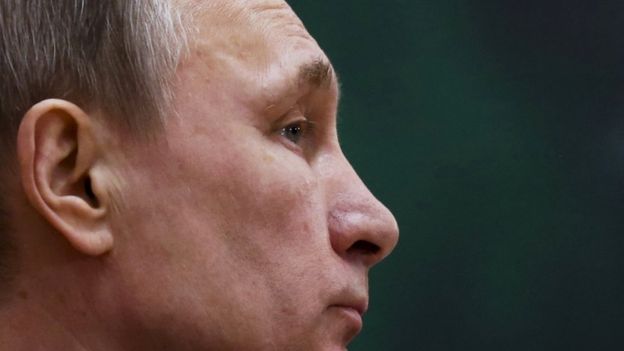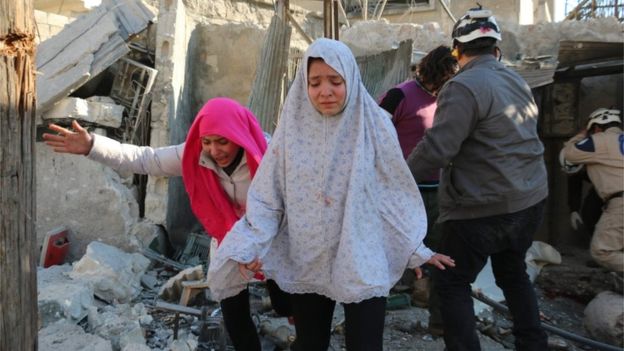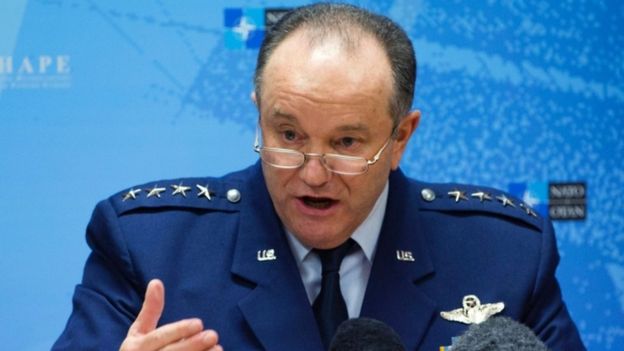West faces up to Putin aggression

"You are invited to take part in a real-time war game with our top experts and an elite team of journalists to examine the nature of Moscow's future activity in the Middle East."
It's not often an email like this drops into the inbox.
My mission, should I choose to accept it, would be to join one of the teams playing the role of either Russia (inevitably the Red Team), Iran, the Western-backed rebels or the extremist group calling itself Islamic State.
The exercise will take place over three days next week and will involve senior figures from the worlds of intelligence, counter-terrorism, defence and academia.
Nowadays, it seems, war games involving Russian military interventions (actual or potential) are all the rage.
Inside the War Room, in which a similar panel of experts was put through its paces, deciding how to respond to a hypothetical scenario involving a Russian military intervention in neighbouring Latvia, a Nato member state.
The result: a nuclear exchange between Russia and the West.
In many respects it is no surprise that Russia is becoming a major focus for those Western officials who spend their time assessing global threats.
Under the long-standing President, Vladimir Putin, the Russian armed forces — recently re-equipped and modernised — have intervened in three countries in the past eight years: Georgia, Ukraine and Syria, all with successful outcomes for the Kremlin.
After what has happened now in Syria, she argues, the West must act before it is too late.
"If Russia prevails through the use of force, it will regard it as a really significant and effective component of its foreign policy and will continue to deploy it," she says.
"And we don't want it to continue to deploy its military in order to get its way at the diplomatic table."
She even says the Kremlin might ultimately try to test Nato's resolve (for example in the Baltics) through its "hybrid" warfare techniques to "try to get Nato to turn the other cheek".
She is not alone in stepping up the anti-Kremlin rhetoric.
Earlier this week, Nato's top commander in Europe, Gen Philip Breedlove, openly accused the Kremlin and Syrian government of using the flow of refugees from Syria as a weapon "in an attempt to overwhelm European structures and break European resolve".
Relations between Russia and the West have been deteriorating steadily over the past decade, but the language used is now being taken to new levels. The gloves are coming off.
Middle East major player
In Syria, the Russian military has played a decisive role, turning the tide of the civil war in favour of President Bashar al-Assad's government and leaving Western powers, who have been backing moderate rebel groups, floundering in their response.
President Putin, who has long bemoaned Russia's loss of influence since the collapse of the Soviet Union, can now stand taller on the world stage, he has become a major player in the Middle East.
Experts say the region "was ripe for Russia to insert itself". And, in recent weeks, many Arab leaders have been heading to Moscow for talks, to the delight of the Russian government.
Some also believe the Kremlin's dominant position in Syria brings leverage in other parts of the world, including Europe.
Most of the refugees streaming from the Middle East to claim asylum in Europe are from Syria. And with the crisis continuing into a second year, EU countries are becoming increasingly divided. Some have decided unilaterally to close their borders to halt the flow.
So how should the West respond to the Kremlin's military action and more assertive foreign policy, which seems to have outmanoeuvred even countries such as the US in the key Middle East region?
Some defence specialists, such as Evelyn Farkas, who recently stood down as deputy assistant secretary of defence in the Pentagon, are convinced there is only one way to approach relations with the Kremlin — and that is to be much tougher.
And, most immediately, that would mean imposing sanctions on Russian officials involved in the military operation in Syria, because they are bolstering President Assad's government.
Without this, Ms Farkas says, the Kremlin will not compromise in any future Syrian peace talks and instead will push for President Assad to remain in power, with his remit extending over the entire Syrian state.
Ms Farkas, who was the Pentagon's top Russian expert, has been calling for a more robust approach to the Kremlin since Moscow's intervention in Ukraine began in 2014.
Политика конфиденциальности | Правила пользования сайтом









